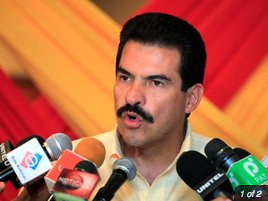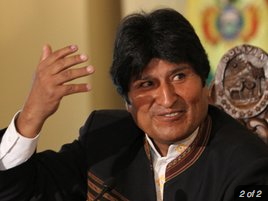
(above) Manfred Reyes Villa was charged Sunday with
embezzling public funds when he was governor
of Cochabamba province. Photo: AP
Defeated Bolivian candidate faces charges
December 14, 2009 - Washington Times
Martin Arostegui
SANTA CRUZ, Bolivia | The government of President Evo Morales has leveled criminal charges against the runner-up in last week's presidential election - a race in which Mr. Morales won a second term in office and his party a two-thirds majority in Congress.
The opposition says the charges reflect a broader postelection crackdown on Bolivia's eastern lowland provinces, which have resisted Mr. Morales' nationalization of its natural gas reserves and other mineral wealth.
Manfred Reyes Villa, a former state governor, appeared in court last week to answer charges stemming from efforts to halt Indian protests six years ago. Authorities have issued two additional summonses for Mr. Reyes Villa to appear in court on corruption charges.
Mr. Morales, who became the country's first Indian president in 2005, is a vocal member of an anti-American bloc of elected leaders in Latin America, the most prominent being Venezuelan President Hugo Chavez.
Last week's landslide re-election victory and the gains in Congress give him the votes needed to overhaul the constitution and, opponents fear, destroy his political opponents.
"This victory gives us the responsibility, obliges us to accelerate the process of change," Mr. Morales said in announcing results of the Dec. 6 vote.
Arriving in Cuba on Sunday for a summit of the Bolivarian Alternative for the Americas (ALBA) - a trade pact formed to exclude the United States - Mr. Morales praised Cuba as a country that inspires new projects, the Cuban ACN news agency reported on its Web site.
 (left) Bolivian President Evo Morales says his re-election victory "gives us the responsibility, obliges us to accelerate the process of change." Photo: AP
(left) Bolivian President Evo Morales says his re-election victory "gives us the responsibility, obliges us to accelerate the process of change." Photo: AP
Mr. Morales outspent Mr. Reyes Villa in the presidential campaign by more than 10-to-1 and made extensive use of government media and other state resources, according to election observers from the European Union and elsewhere.
In addition to filing multiple charges against Mr. Reyes Villa, the government seized a 48-square-mile ranch belonging to Branko Marinkovic on Wednesday.
Until last year, Mr. Marinkovic led the anti-Morales Santa Cruz Civic Committee. Based in the eastern province of Santa Cruz, the committee is a major center of opposition to the leftist president.
Mr. Morales has publicly accused Mr. Marinkovic of paying for Mr. Reyes Villa's presidential campaign and threatened to imprison both.
"Anyone who thinks differently is being persecuted. What have I done? Be a candidate?" Mr. Reyes Villa said last week.
Tensions in Bolivia reflect an ethnic divide between an impoverished Indian majority in the Andean highlands and the east, populated by Bolivians of European ancestry.
Mr. Reyes Villa won about 28 percent of the national vote, compared with about 62 percent for Mr. Morales.
In the east, however, Mr. Reyes Villa carried Santa Cruz, Beni and Pando provinces.
Prosecutors last week also accused Mr. Reyes Villa of embezzling public funds when he was governor of Cochabamba province.
"There is a blacklist of people who are not in agreement with MAS to finish and exterminate them," said Santa Cruz Judge Luis Tapia Pachi, using the Spanish initials for Mr. Morales' Movement for Socialism party.
Mr. Morales also announced legislation that would eliminate banking privacy laws.
Officials said the government is following through on pledges to stamp out official corruption and redistribute the country's wealth to the Indian majority that supports Mr. Morales.
Ricardo Almaraz, the vice minister for land reform, defended the seizure of the Marinkovic estate on the grounds that it came under the jurisdiction of a local Indian tribe.
"Finally, we are taking land back from Slavic hands to place into original Bolivian hands," said Mr. Almaraz, referring to Mr. Marinkovic's Eastern European parentage.
"There has been discrimination in favor of first-generation Bolivians," said Mr. Almaraz. He accused Mr. Marinkovic of acquiring much of his estate through fraud.
Mr. Marinkovic was said to be hiding in Bolivia or out of the country. His attorneys insist the property was titled legally.
"Land for them is really a political objective," said Luis Nunez, who recently replaced Mr. Marinkovic as president of the Santa Cruz Civic Committee.